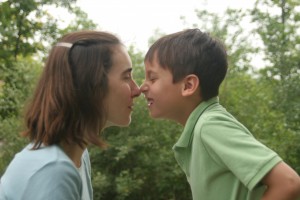
Parenting  One day in early December, we were walking to school in the rain, huddled under our umbrella. The morning light was misty and gray, and our street was exceptionally quiet, as if we had the whole world to ourselves.
I exclaimed, “What a beautiful day! I love this weather.”
Smiling, he answered, “Yes. Me, too.”
What do you think? Has your experience of parenting a child with special needs become easier for you?
One day in early December, we were walking to school in the rain, huddled under our umbrella. The morning light was misty and gray, and our street was exceptionally quiet, as if we had the whole world to ourselves.
I exclaimed, “What a beautiful day! I love this weather.”
Smiling, he answered, “Yes. Me, too.”
What do you think? Has your experience of parenting a child with special needs become easier for you?
Special Needs Parenting: Does it get easier?
Last week in the Friendship Circle blog, Jennifer wrote about the importance of developing self-confidence as a parent of a child with special needs. Part of that confidence comes from daily routines and structure at home and school, and part of it comes from following evidence-based practices. This has certainly been true for my family, too. Today I am responding to Jennifer's conclusion: that parenting a child with special needs will become easier over time. I’m sure that some parents of children with special needs discover that their parenting challenges become easier over the years. Others, such as myself, face new challenges with each passing year. I can’t promise anyone new to this journey that it will be less rocky next month, next year or even 10 years from now. I can’t promise that the experience will make you or your child a better person, either. Here’s why:1. You may not be seeing the whole picture right now.
A friend of mine also has a son with autism. She actively pursued his therapies and saw her son make excellent progress in relationship skills, social skills and speech within a few years. But none of the medical specialists had ever told her that her son actually had a dual diagnosis of autism and cerebral palsy - until her son was 6 years old. Then he was diagnosed with a hearing impairment. Over the years, more diagnoses were added as his health problems were sorted out.2. Developmental and educational issues are dynamic, not static.
In my son’s case, his primary symptom as a toddler was severe anxiety, with impaired sensory processing as a secondary symptom. When the anxiety became manageable, there were attention issues, so we worked on self-regulation exercises, gymnastics lessons and visual tracking. When he was able to pay attention, his cognitive ability became the focus of his therapy. Now that we have found some effective learning tools for him, we are working on memory and preventing regression. But he’s spent so much time working on these areas that he has fallen far behind his classmates, who have been making consistent developmental progress all along.3. New medical problems often arise in adolescence
For children with heart conditions or brain injury, health complications may worsen during these years. Adolescents with autism have an increased risk for seizures, catatonia and mood disorders. Because of the nature of autism, mood disorders may be difficult to recognize until a person starts injuring himself or expressing suicidal thoughts. This is of special concern to me, since my family has a history of suicide and attempted suicide.4. Planning for adulthood begins in childhood
There is no clear path for seeking housing, employment and personal fulfillment for our children with special needs when they reach adulthood. Parents need renewed energy and creativity as we advocate for our adult children. In her recent Washington Post article, Susan Senator writes, “It has always been up to my husband and me. I never thought that figuring out autistic adulthood would be the same way. Now that Nat has finished school, I feel like I am right where I started, the diagnosis days: grieving, confused, panicked.”5. Moral support is not guaranteed
Along the way, I’ve had some hard lessons about the difference between conditional and unconditional love. I don’t know how to fix friendships and family relationships that exclude or hurt my son. That will not become easier for me. I am fond of saying that it takes a village to raise a typical child, but it takes an army to raise a child with special needs. This is why the Friendship Circle is so vital to my family life. Not only are the volunteers, classes and programs beneficial to my children, but even hanging out in the parent lounge has been a great education for me. Are you looking for a terrific optometrist who has experience with children with disabilities? I’ve got his number right here. A neurologist? A dentist? A gymnastics coach? My latest sensory integration tricks? With the support of my son’s army, I have been able to research ways to help my son -- and the areas in which he needs help have changed from month to month. Adaptability and multi-tasking are second nature to me now, yet I’m always just starting to learn about a new area. Even on a parenting journey that’s muddy, uphill all the way, with a sheer cliff on one side, there is still the choice to discern joy or misery in it. I have cherished every day of my son’s childhood so far, because I know it’s a luxury simply to be with him. One day in early December, we were walking to school in the rain, huddled under our umbrella. The morning light was misty and gray, and our street was exceptionally quiet, as if we had the whole world to ourselves.
I exclaimed, “What a beautiful day! I love this weather.”
Smiling, he answered, “Yes. Me, too.”
What do you think? Has your experience of parenting a child with special needs become easier for you?
One day in early December, we were walking to school in the rain, huddled under our umbrella. The morning light was misty and gray, and our street was exceptionally quiet, as if we had the whole world to ourselves.
I exclaimed, “What a beautiful day! I love this weather.”
Smiling, he answered, “Yes. Me, too.”
What do you think? Has your experience of parenting a child with special needs become easier for you?



